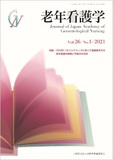Japanese
English
- 販売していません
- Abstract 文献概要
- 参考文献 Reference
抄録
本研究は,レビー小体型認知症(DLB)との診断がついた後,在宅で暮らすDLBの人を看ている家族の介護体験を明らかにすることを目的とした.研究参加者5人に半構造化面接法を行い,質的帰納的に分析した.結果として9のカテゴリーを見いだした.家族介護者は【幻視による混乱】と【多様な症状への対応の模索】,そして【薬の副作用による介護負担の増加】を感じながら,【日々の介護疲れの蓄積と増幅】を繰り返していた.さらに,【不満を覚えるような不適切な専門職者の対応】がこれら負の循環を助長させていた.この循環から抜け出すためには【支えとなる他者からの協力】が必須であり,【多様な症状を予測した対応】ができるようになった家族介護者は【新たな家族役割の自覚】が芽生え【本人と家族にとってのよりよい選択】を判断できるようになっていた.DLBは全身病ともよばれるほど症状が多様でその理解が難しい.ゆえに専門職者がDLBの知識を身につけ,家族と共に対応策を考えながら心身両面を支える必要性が示唆された.
The purpose of this study was to describe the experience of family caregivers providing at-home care for people with dementia with Lewy bodies (DLB) following a diagnosis. Semi-structured interviews of five family caregivers of people with DLB were conducted. As a result, we identified nine categories for family caregiver experiences. Family caregivers were “continuously overwhelmed due to accumulating fatigue from the amplification of daily care”, while feeling “confusion due to hallucinations”, “managing various other symptoms” and “increasing caregiver burden due to side effects of drugs”. “Correspondence of inappropriate medical professionals who are dissatisfied” perpetuated this negative cycle. To escape this cycle, it is necessary “to seek and accept the cooperation of other supportive people”. These include experienced family caregivers who are able to “predict and respond to various symptoms”, “are aware of the new family roles”, and “have made more informed choices for people with DLB and other family caregivers”. DLB is a systemic disease, affecting multiple organs and presenting a variety of symptoms which make it difficult to understand. Therefore, it was suggested that professionals should first acquire in-depth knowledge of DLB and then support the physical and mental aspects of the family caregiver while collaboratively considering countermeasures.
Copyright © 2021, Japan Academy of Gerontological Nursing All rights reserved.


